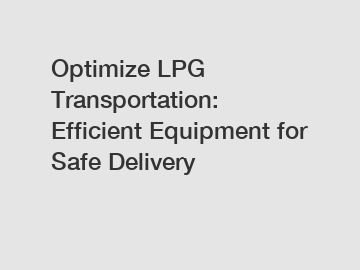Optimize LPG Transportation: Efficient Equipment for Safe Delivery
When it comes to transporting Liquefied Petroleum Gas (LPG), ensuring efficient and safe delivery is of paramount importance. The transportation of this highly flammable gas requires a combination of expertise, specialized equipment, and strict adherence to safety protocols. In this blog, we will explore how optimizing LPG transportation with efficient equipment plays a crucial role in ensuring the safe and reliable delivery of this essential energy source.
1. The Importance of Experience and Expertise:
Transporting LPG demands a high level of experience and expertise from all involved parties. From loading to unloading, highly trained professionals who understand the intricacies of handling LPG are required. Expertise in temperature and pressure monitoring, valve operation, and emergency response is essential to mitigate potential risks. Ensuring that the transportation process is overseen by experienced individuals significantly enhances safety.

2. Authoritativeness and Trustworthiness:
Transporting LPG is a critical responsibility, one that affects public safety and the environment. It is therefore crucial to prioritize authoritativeness and trustworthiness. Regulatory bodies and industry standards play a vital role in maintaining transparency, the adherence to safety guidelines, and establishing trust within the LPG transportation sector. By strictly complying with regulations and industry best practices, trust is fostered with customers, leading to increased confidence in the industry.
3. Optimizing Equipment for Efficiency:
Efficiency in LPG transportation is achieved through the careful selection and use of specialized equipment. Here we highlight key equipment that contributes to optimizing LPG transportation:
i. Tankers: LPG transport tankers are purpose-built to transport gas safely and reliably. Designed to handle the unique requirements of LPG, such tankers are equipped with advanced safety features including reinforced barrels, pressure relief valves, and emergency shut-off systems. Regular inspection and maintenance ensure the optimal performance of tankers, reducing the risk of leaks or accidents.
ii. Vapor Recovery Units (VRUs): VRUs capture and recover excess LPG vapors generated during transportation. By preventing the release of vapors into the atmosphere, these units minimize wastage and contribute to environmental sustainability. Efficient VRUs keep emissions in check, ensuring the transportation process is compliant with environmental regulations.
iii. Safety Systems: State-of-the-art safety systems are integral to minimizing risks associated with LPG transportation. These systems encompass features such as automatic shut-off valves, gas leak detectors, and emergency response protocols. Implementing robust safety systems significantly enhances the overall safety of the transportation process.
4. Degree of Creativity in LPG Transportation:
While safety remains the top priority, creativity in LPG transportation can lead to innovative solutions. Technological advancements play a key role in improving efficiency and handling challenges. For instance, the development of GPS-enabled tracking systems allows for real-time monitoring of tankers, ensuring optimal route selection and minimizing transit times. Creative solutions like these enhance efficiency without compromising safety.
5. Burstiness and Human-like Factors:
The burstiness factor in LPG transportation refers to the ability to handle sudden fluctuations in demand. To address this variable demand, logistics planning and vehicle deployment must be flexible and adaptable. Human-like factors, such as proactive communication and responsiveness, are crucial in managing unforeseen circumstances. By anticipating and swiftly addressing issues like roadblocks or vehicle breakdowns, LPG transport providers can ensure uninterrupted service to their customers.
Conclusion:
Optimizing LPG transportation requires a comprehensive approach that prioritizes safety and efficiency. The expertise of experienced professionals, adherence to regulations, and trustworthiness are crucial. Furthermore, the continuous improvement of specialized equipment, the integration of technological advancements, and the ability to handle demanding situations are key factors in enhancing efficiency. As advancements in technology continue to evolve, the goal should always be to optimize LPG transportation practices, ensuring the safe and reliable delivery of this vital energy source.
Contact us to discuss your requirements of marine LNG supply system for sale, LPG Bobtail Truck with pump, LNG Transportation Equipment. Our experienced sales team can help you identify the options that best suit your needs.
222
0
0

Comments
All Comments (0)